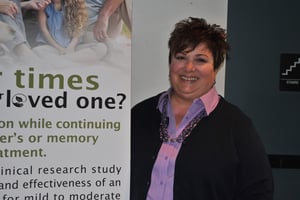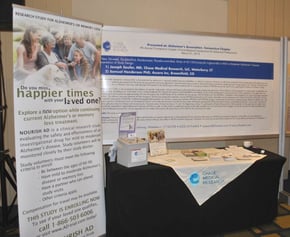Cheryl Nickles, Patient Recruitment Coordinator at Chase Medical, recently attended the 18th Annual Dementia Education Conference, sponsored by the Connecticut chapter of the Alzheimer’s Association. The conference is designed to provide information and creative ideas to both the caregivers of people with Alzheimer’s and other dementias, as well as professionals who work with those individuals.
Here are just a few of her takeaways from what was an extremely enlightening and powerful conference -
Conference Overview 
The presenters and speakers addressed a range of topics, from legal advice to creative therapy. As a team member with an aging mother, these issues are very relevant and can help me in better understanding care for my own family members.
Because I frequently interact with Alzheimer’s patients and their families, I also attended to learn more about any advancements made in the field as well as to learn how to better understand caregivers and their wards.
I attended many fantastic sessions and gained some wonderful new insight on treatment methods, care, and bettering the lives of those with dementia. Here are some recaps of just a few of the compelling sessions I attended -
Family Dynamics and Caregiving
One session, Family Dynamics and Caregiving: Usual and Unexpected Challenges, was presented by Roni Lang, a licensed social worker who works out of Greenwich Hospital. The session addressed unusual challenges that families face when they are dealing with patients who have dementia or Alzheimer’s.
Often times, family members find it difficult to maintain cohesiveness. Every family is different in terms of personalities and circumstances, but it's very important for families to attempt to maintain harmony when caring for someone with dementia. One way to do this is by assigning responsibilities, and ensuring everyone knows what they can do to help.
Lang presented a checklist outlining when it is time to start assigning responsibilities. The list contains everything that has to be done to minute detail so that families can see what and how things should be done and who is doing it. Putting the list on a tangible piece of paper helps family members see the overwhelming amount of responsibility involved with being a spokesperson for someone who can’t speak for themselves anymore. It also helps them evenly divide responsibilities so that the burden of stress doesn’t fall squarely on one person.
This session opened up a dialog between caregivers and gave professionals the perspective they need to be able to serve these families better. This session was hugely useful to me because it gave me an inside look at the lives of the patients and caregivers I interact with on a daily basis. It also gave me some great insights about maintaining harmony and cohesiveness in the home when things are getting tough.
Younger Onset Alzheimer’s
Another session, directed by Sharon Pope, JD, was titled Navigating the Challenges Associated with Younger Onset Alzheimer’s Disease. There are many legal challenges that occur when a younger person is diagnosed with Alzheimer’s. This session covered those legal issues, as well as asset protection, long term planning and resource allocation. Packed with information, the session addressed what families need to do ahead of time, the rights and limitations involved with Younger Onset Alzheimer’s, and what unique challenges these families face.
The session also brought up an excellent point about Alzheimer’s awareness. As the costliest killer, Alzheimer’s costs more than cancer or heart disease, and is one of the lowest funded diseases in terms of support and research. The hope is that as awareness and funding increase, so will the rate of survival for Alzheimer’s patients. Just as focused attention and research dollars contributed to the HIV cocktail of drugs that has not only helped people with HIV live longer, but also increased the survival rate of babies born to HIV positive mothers, the hope is that a combination of drugs and therapy will be discovered that will improve the cognitive capability and mortality rate of Alzheimer’s patients.
The National Alzheimer’s Project Act (NAPA) is tasked with creating a strategic plan that will increase funding to Alzheimer’s research. Signed into law by President Obama in early 2011, the plan is hoped to bring significant research dollars by 2025.
Singing in the Brian
Presented by an Episcopalian Chaplain, the session called Singin’ in the Brain: Singing, Neuroscience and Fun for All Ages, was devoted to communicating the impact of singing and music on the brains of both well patients and patients with dementia and Alzheimer’s. This was a great session that taught me a lot about alternative therapies, like singing, that make a positive impact on the lives of people with Alzheimer's.
Singing and music light up the brain in an MRI and stimulates every section of the brain. It is greatly therapeutic in patients with Alzheimer’s, especially since the disease affects one of the main parts of the brain – the cerebellum and brain stem.
People lose their short term memory, but they have a firm grip of their past up to a certain point. Listening to music can bring memories flooding back, and patients respond by smiling, humming, and even singing.
It’s also been found that, as modern medicine has increased the life span of people with Down’s Syndrome, as many as 75% of those patients develop Alzheimer’s disease. Singing is great therapy for patients with Down’s Syndrome as well as those with Alzheimer’s.
Overall
The Dementia Education Conference was a fantastic learning experience. As someone who regularly works with Alzheimer's patients and their caregivers, it's beneficial to attend conferences like these and learn more about the condition. The sessions I attended gave me some great insights and showed me what the future looks like for people dealing with Alzheimer's.
The conference and the sessions gave us hope that there is a cure in the future for Alzheimer’s and similar forms of dementia. We think it’s going to be a combination of treatments, including a drug “cocktail” that will make the difference. For now, early detection and early treatment are giving people hope.
We can't wait to attend the event next year!
If you're interested in learning more about participating in an Alzheimer's clinical trial, click the link below.
Share This Post
Recent Posts
- Relationship Between Obesity & Cardiovascular Disease May 18 2015
- What to Know About Vaccines May 18 2015
- What is Blood Pressure & What do Your Numbers Mean? A Quick Refresher. May 18 2015
- My Sugars Are Still High - Is Insulin the Right Choice for Me? May 18 2015
- Great News! Treatment Options for Chronic Kidney Disease May 18 2015
Categories
- Clinical Trials
- Diabetes
- Cardiovascular Disease
- Obesity
- Kidney Disease
- Pain Management
- Vaccine
- Female Sexual Dysfunction
- Migraine
- Chronic Obstructive Pulmonary Disease
- Osteoarthritis
- Alzheimer's
- Biologics
- COVID-19
- Diabetic Peripheral Neuropathy
- Gastroesophageal Reflux Disease
- Hypertension
- Irritable Bowel Syndrome with Constipation
- Lyme Disease
- Nonalcoholic Steatohepatitis
- Respiratory Syncytial Virus



